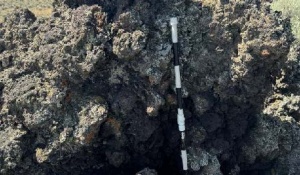The Impact of Rafted Scoria Cone Fragments on the Final Planform of Effusive Basaltic Lava Flows
By: Andrew Gmerek (andrewgm@buffalo.edu)
Advisor: Tracy Gregg, PhD
Earth Science Department
Project Objetives
• Do rafted scoria cone fragments impact the final planform of effusive basaltic lava flows?
• If they do impact it then they need to be included in lava flow prediction models to improve preparedness
• Observe contacts between effusive basaltic flows and scoria cones to more accurately map similar contacts in Venusian volcanic flow fields
Data and Results
• Went to Devil’s Garden volcanic field in Oregon and assessed potential rafted coria cone fragments
• Small (<3m long axis) rafted scoria cone fragments do not significantly impact the lava flows
• Large (>15m long axis) rafted scoria cone fragments caused lava flows to flow around them, but did not impact flow direction
• Rafted scoria cone fragments did not significantly impact the final planform of effusive basaltic flows at Devil’s Garden volcanic field
Significance
• This project offers a new venue for better understanding human behaviors under natural disaster through human mobility networks. This could inform equitable resource allocation in disaster management
• The next step is to develop a human-centric framework for resource allocation to ensure the fairness and efficiency
Significance
• Current lava flow models do not need to include rafted scoria cone fragments altering the course of a lava flow in Devil’s Garden-like flows
• More work is needed at other field sites to support or refute our findings

A small (<3m long axis) rafted scoria cone sitting atop a solidified effusive basaltic flow. Inset image is of the spatter texture used to identify rafted scoria cone fragments. Jacob’s staff included for scale.